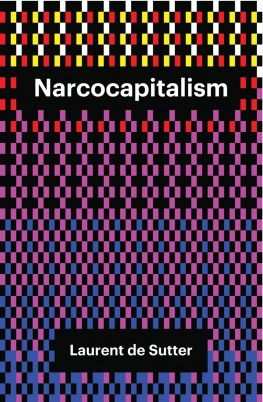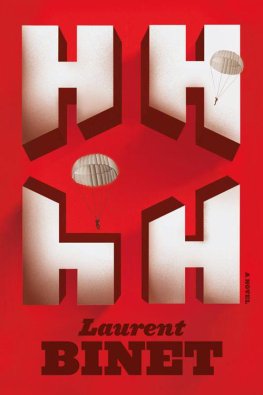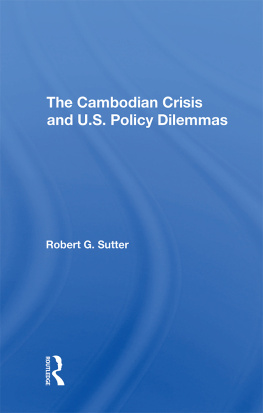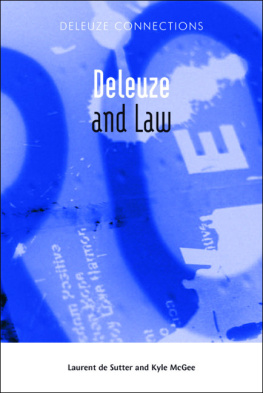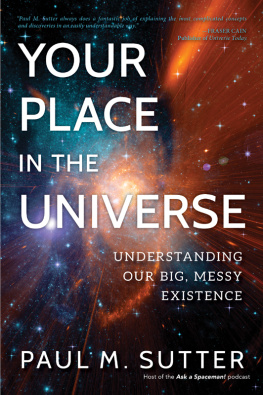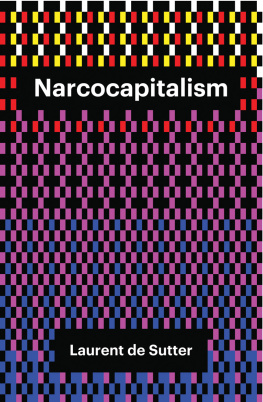de Sutter Laurent - Narcocapitalism
Here you can read online de Sutter Laurent - Narcocapitalism full text of the book (entire story) in english for free. Download pdf and epub, get meaning, cover and reviews about this ebook. year: 2017, publisher: Polity Press, genre: Religion. Description of the work, (preface) as well as reviews are available. Best literature library LitArk.com created for fans of good reading and offers a wide selection of genres:
Romance novel
Science fiction
Adventure
Detective
Science
History
Home and family
Prose
Art
Politics
Computer
Non-fiction
Religion
Business
Children
Humor
Choose a favorite category and find really read worthwhile books. Enjoy immersion in the world of imagination, feel the emotions of the characters or learn something new for yourself, make an fascinating discovery.
- Book:Narcocapitalism
- Author:
- Publisher:Polity Press
- Genre:
- Year:2017
- Rating:4 / 5
- Favourites:Add to favourites
- Your mark:
- 80
- 1
- 2
- 3
- 4
- 5
Narcocapitalism: summary, description and annotation
We offer to read an annotation, description, summary or preface (depends on what the author of the book "Narcocapitalism" wrote himself). If you haven't found the necessary information about the book — write in the comments, we will try to find it.
Narcocapitalism — read online for free the complete book (whole text) full work
Below is the text of the book, divided by pages. System saving the place of the last page read, allows you to conveniently read the book "Narcocapitalism" online for free, without having to search again every time where you left off. Put a bookmark, and you can go to the page where you finished reading at any time.
Font size:
Interval:
Bookmark:

Theory Redux
Series editor: Laurent de Sutter
Published Titles
Alfie Bown, The Playstation Dreamworld
Laurent de Sutter, Narcocapitalism:
Life in the Age of Anaesthesia
Roberto Esposito, Persons and Things
Graham Harman, Immaterialism: Objects and
Social Theory
Sreko Horvat, The Radicality of Love
Dominic Pettman, Infinite Distraction:
Paying Attention to Social Media
Nick Srnicek, Platform Capitalism
Laurent de Sutter
Translated by Barnaby Norman
polity
Copyright Laurent de Sutter 2018
The right of Laurent de Sutter to be identified as Author of this Work has been asserted in accordance with the UK Copyright, Designs and Patents Act 1988.
First published in 2018 by Polity Press
Polity Press
65 Bridge Street
Cambridge CB2 1UR, UK
Polity Press
101 Station Landing, Suite 300
Medford, MA 02155, USA
All rights reserved. Except for the quotation of short passages for the purpose of criticism and review, no part of this publication may be reproduced, stored in a retrieval system or transmitted, in any form or by any means, electronic, mechanical, photocopying, recording or otherwise, without the prior permission of the publisher.
ISBN-13: 978-1-5095-0687-3
A catalogue record for this book is available from the British Library.
The publisher has used its best endeavours to ensure that the URLs for external websites referred to in this book are correct and active at the time of going to press. However, the publisher has no responsibility for the websites and can make no guarantee that a site will remain live or that the content is or will remain appropriate.
Every effort has been made to trace all copyright holders, but if any have been inadvertently overlooked the publisher will be pleased to include any necessary credits in any subsequent reprint or edition.
For further information on Polity, visit our website: politybooks.com
Its all about chemicals.
Andy Warhol
Sara Amari, Franco Berardi, Pascal Chabot, Ewen Chardronnet, Gilles Collard, Neil de Cort, Nicholas Deschamps, Marguerite Ferry, Peter Goodrich, Line Hjorth, Geraldine Jacques, Elliott Karstadt, Monique Labrune, Louise Lame, Aude Lancelin, Camille Louis, Sophie Marinopoulos, Lilya At Menguellet, Barnaby Norman, George Owers, Bernard Stiegler, John Thompson, Henri Trubert, Paul Young, and Marion Zilio.
Goin Down
0. Patent US4848. On 12 November 1846, Charles Thompson Jackson and William Green Morton, from Boston, filed a patent with the United States Patent Office. It received the number 4848, and, as its introduction noted, concerned the improvement of surgical operations.reference to Discord, the goddess of Oblivion, daughter of Eris, seemed dubious to Holmes after all, with the inhalation of ether, it was less a question of amnesia than insensibility, less a case of returning from the world of the dead than of staying in that of the living. No matter; the US Patent Office gave Jackson and Morton the patent they had asked for and with this, a new age dawned: the age of anaesthesia.
Welcome to Prozacland
1. From symptom to syndrome. When Emil Kraepelin published the sixth edition of his Lehrbuch der Psychiatrie in 1899, he had for some time already been a model of scientific success a model, that is, according to the standards of German science of his day.
*
2. When being errs. Unexpectedly, for those unfamiliar with his work, Kraepelin did not provide a definition of manic-depressive psychosis (or manisch-depressiven Irresein in German), contenting himself with describing the features grouped under this name. These were of either a physical or psychic type, with the latter present in greater number in Kraepelins description including sensory disorders and delusional disorders, avolition and logorrhea.it had been accepted that physical characteristics were transmitted from generation to generation, it seemed certain to him that mental illnesses, or at least the predisposition to develop them, were also transmitted, with no hope of recovery or redemption. Madness was not an accident that it was possible to survive; it was part of the very being (Sein) of the sufferer, whose erring (Irre) must continue inevitably, even beyond itself.
*
3. What is excitation? Even though he did not risk a definition of manic-depressive psychosis, a disturbing element kept cropping up as Kraepelin went through the symptoms of the illness: excitation. Whatever the symptom described, it was differentiated according to the state of excitation of the patient, which could refer to a physical or psychic agitation, could be positive or negative, and could relate to the manic or the depressive phase. More than the symptom itself, it was its intensification by excitation that should hold the observers attention, and that, combined with other symptoms of the same order, would allow for the classification of the patient as a victim of manic-depressive as sane. To get rid of the illness, therefore, you would have to attack the capacity to be excited which is to say, the bodily element that carried being away into extreme regions that no normal human should be allowed to frequent.
*
4. Enter chloral. Kraepelins physicalism could have remained a curiosity, relegated to the margins of the history of psychiatry but, in a few years, it had become the default setting for thinking about mental illnesses in Europe, and then, later, in the United States.it was even, in line with Kraepelins pessimistic doctrine, the only treatment they could hope to receive.
*
5. Powers of deflation. A manic-depressive does not get better; all you can do is try to calm them down make sure, that is, that the excitation affecting them is reduced to nothing, in favour of an enforced but harmless stability. In other words, with someone suffering from manic-depressive psychosis, you can only hope to control the manic element including what remains of it during a depressive phase. The only good manic-depressive is a depressive separated from the uncontrollable half of their syndrome, the part that justifies their clinical confinement, with the understanding that the care given is limited to the policing of restless bodies. From the moment it was used predominantly to deaden excitation, chloral hydrates success was assured: if manic excitation was also bodily hyperesthesia, it made sense to remove every sensation that might lead to it. The dynamic of excitation was a dynamic of affection: psychomotor agitation was produced when the sufferers being was overrun by sensations Manic-depressive psychosis meant a kind of disontologization: it was how what affects being separated it from itself, in favour of a play of unpredictable forces which threatened to affect other individuals in turn. To fight it, therefore, you had to be able to reinstate being within its limits, to muffle the call of the outside to which it sought to respond, deafening it to what would otherwise lead it to an experience of excess to an experience that it was assumed was too difficult for it. The sweet anaesthesia afforded by chloral hydrate could fulfil these requirements; where being had inflated out of all proportion, it could bring about its radical deflation through the withdrawal of the affective energies feeding its inflation. Useless sensations were silenced, so that all that was left was a kind of continuous, vaporous and weakened bassline, whose rhythm taught the erring being that the only stroll it could take was around the grounds.
Font size:
Interval:
Bookmark:
Similar books «Narcocapitalism»
Look at similar books to Narcocapitalism. We have selected literature similar in name and meaning in the hope of providing readers with more options to find new, interesting, not yet read works.
Discussion, reviews of the book Narcocapitalism and just readers' own opinions. Leave your comments, write what you think about the work, its meaning or the main characters. Specify what exactly you liked and what you didn't like, and why you think so.

